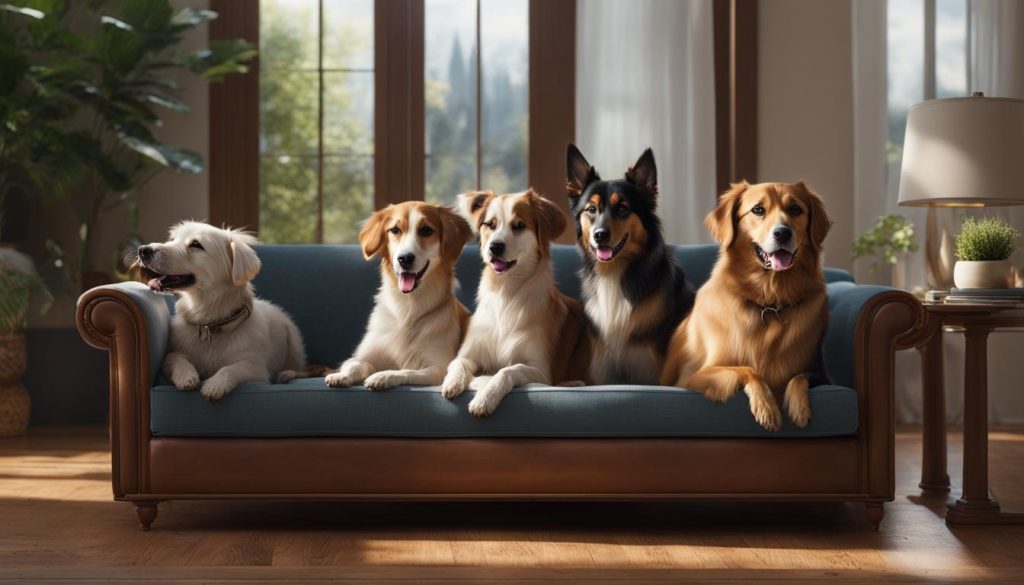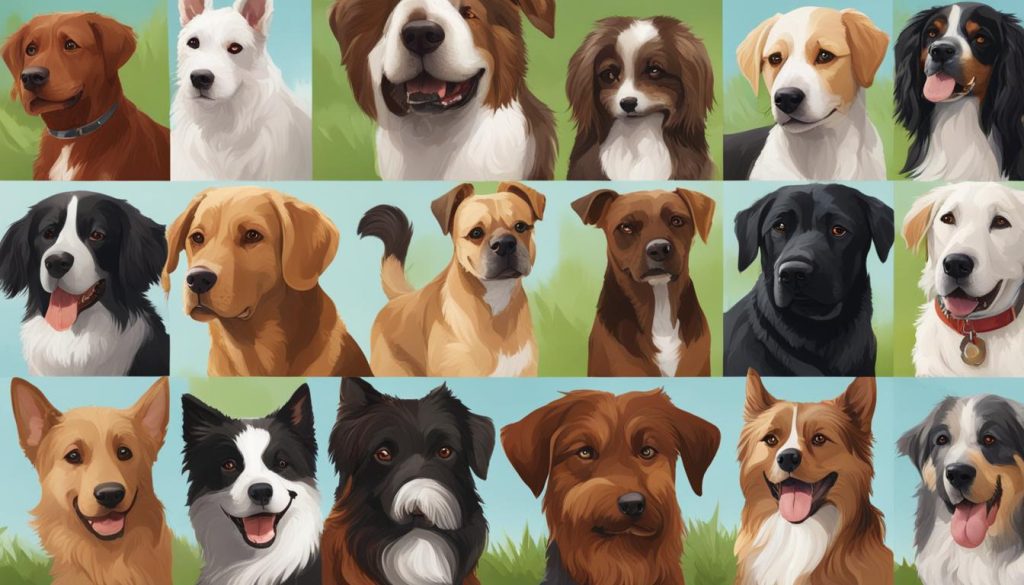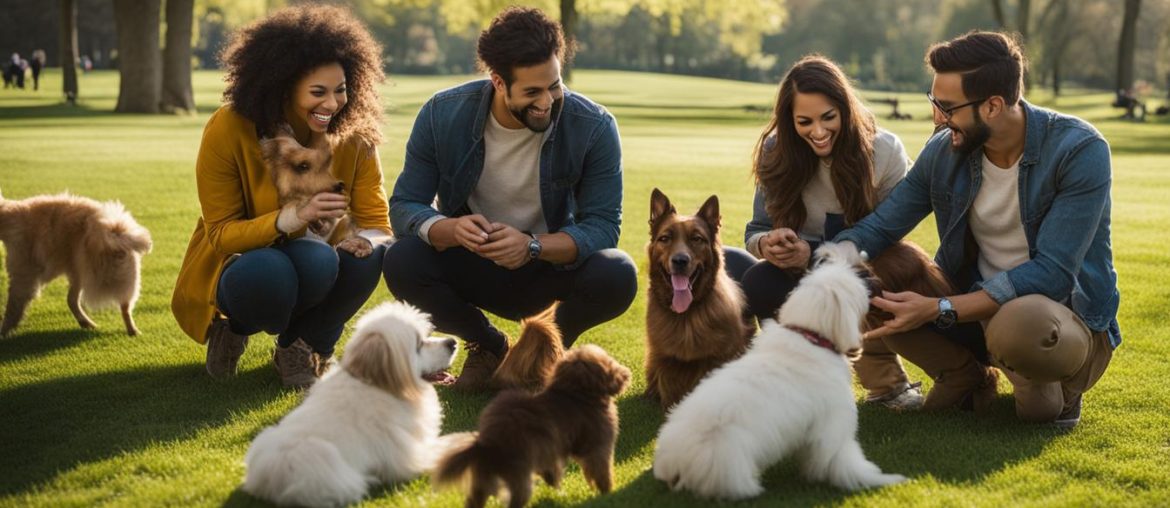If you’re one of the millions of people worldwide who suffer from pet allergies, you’ll be relieved to know that there are hypoallergenic dog breeds that produce fewer allergens. These breeds are perfect for allergy sufferers who still want to enjoy the companionship of a furry friend. In this comprehensive guide, we’ll explore the best hypoallergenic dog breeds and why they make great choices for people with allergies.
Key Takeaways:
- Hypoallergenic dog breeds are ideal for allergy sufferers who still want a furry companion.
- These breeds produce fewer allergens, such as dander, saliva, or urine.
- Individual sensitivity to allergens can vary, so spending time with a dog before bringing it home is crucial.
- Popular hypoallergenic dog breeds include Bichon Frise, Chinese Crested, Poodle, Schnauzer, Shih Tzu, Yorkshire Terrier, Maltese, Basenji, Kerry Blue Terrier, and Portuguese Water Dog.
- Choosing a hypoallergenic dog breed can significantly reduce allergy symptoms, but additional measures like regular grooming and washing can further minimize allergic reactions.
What Does Hypoallergenic Mean in Relation to Dogs?
When it comes to dogs, hypoallergenic refers to breeds that are less likely to trigger an allergic reaction in individuals with dog allergies. While no dog can be completely allergen-free, hypoallergenic breeds produce fewer allergens such as dander, saliva, or urine. individual sensitivity to allergens can vary, so spending time with a dog before bringing it home is crucial.
For people with allergies, the term “hypoallergenic” is often associated with dogs that are considered more allergen-free compared to other breeds. These hypoallergenic breeds typically have non-shedding or low-shedding coats, which means they release less dander into the air. Dander, which consists of dead skin cells, is a common allergen that can cause allergic reactions in sensitive individuals.
“Hypoallergenic dog breeds are often recommended for allergy sufferers because they produce fewer allergens. However, remember that hypoallergenic does not mean allergen-free. Allergies are complex and can be influenced by various factors, including an individual’s sensitivity to specific allergens.”
While hypoallergenic breeds can be a great choice for people with allergies, please understand that individual reactions can still vary. Some individuals may still experience allergic symptoms when exposed to certain hypoallergenic breeds. Therefore, it’s recommended to spend time with a dog of a hypoallergenic breed before making a decision to ensure compatibility with your allergies.

Hypoallergenic Dog Breeds
| Breed | Coat Type | Allergen Level |
|---|---|---|
| Poodle | Curly or Corded | Low |
| Bichon Frise | Curly | Low |
| Maltese | Silky | Low |
| Shih Tzu | Long | Low |
| Yorkshire Terrier | Long | Low |
These are just a few examples of hypoallergenic dog breeds. The coat type and allergen level can vary within each breed, and consult with breeders or shelters to get more specific information about individual dogs. Additionally, regular grooming and cleaning of the dog’s living areas can help minimize allergen exposure and reduce the likelihood of allergic reactions.
Most Popular Hypoallergenic Dog Breeds
When it comes to hypoallergenic dog breeds, there are several popular options that are recommended for people with allergies. These breeds are known for producing fewer allergens, making them a top choice for allergy sufferers who still want to enjoy the companionship of a furry friend.
Breeds
| Breed | Description |
|---|---|
| Bichon Frise | This small, fluffy breed is known for its friendly and affectionate nature. Bichon Frises are great family pets and are often recommended for people with allergies due to their hypoallergenic coat. |
| Chinese Crested | The Chinese Crested comes in two varieties: Hairless and Powderpuff. While the Hairless variety is often preferred for allergy sufferers, both varieties are hypoallergenic and produce fewer allergens. |
| Poodle | Poodles are highly intelligent and versatile dogs, available in different sizes – Toy, Miniature, and Standard. They have a hypoallergenic coat that sheds minimally, making them a popular choice for allergy sufferers. |
| Schnauzer | Schnauzers are known for their distinctive beards and bushy eyebrows. They are friendly, alert, and make excellent companions. Their hypoallergenic coat makes them suitable for people with allergies. |
| Shih Tzu | This small breed is loved for its beautiful flowing coat and friendly personality. Shih Tzus are hypoallergenic, making them a great choice for allergy sufferers who want a low-shedding companion. |
| Yorkshire Terrier | Yorkshire Terriers, or Yorkies, are small and energetic dogs with a hypoallergenic coat. They are known for their loyalty and make great companions for people with allergies. |
| Maltese | The Maltese is a small breed known for its long, silky white coat. Despite their luxurious coat, Maltese dogs are hypoallergenic and produce fewer allergens, making them suitable for people with allergies. |
| Basenji | The Basenji is a unique breed known for its distinctive yodel-like vocalizations. They have a short, low-shedding coat that is hypoallergenic, making them a great choice for allergy sufferers. |
| Kerry Blue Terrier | Kerry Blue Terriers are medium-sized dogs with a distinctive blue-gray coat. They are energetic, intelligent, and have a hypoallergenic, non-shedding coat that makes them suitable for people with allergies. |
| Portuguese Water Dog | Portuguese Water Dogs are medium-sized dogs known for their curly, hypoallergenic coats. They are highly trainable and make great companions for people with allergies. |
These popular hypoallergenic dog breeds offer a range of sizes, personalities, and appearances, ensuring that there is a perfect hypoallergenic companion for every allergy sufferer.
Best Hypoallergenic Dog Breeds for Families with Kids
If you have children and allergies, it can be challenging to find a hypoallergenic dog breed that is also kid-friendly. Fortunately, there are several breeds that are not only hypoallergenic but also great companions for children. These breeds are known for their friendly, affectionate nature and their ability to adapt well to family environments.
One of the best hypoallergenic dog breeds for families with kids is the Bichon Frise. These small, fluffy dogs are known for their playful and gentle nature, making them ideal playmates for children. They are also hypoallergenic, meaning they produce fewer allergens that can trigger allergies in sensitive individuals.
Poodles are another popular choice for families with kids and allergies. They come in different sizes, including toy, miniature, and standard, making it easy to find a poodle that fits your family’s lifestyle. Poodles are known for their intelligence, trainability, and friendly disposition, making them great family pets.
The Soft Coated Wheaten Terrier is another hypoallergenic breed that is well-suited for families with kids. These dogs are known for their friendly and affectionate nature, and they love spending time with their families. They are also energetic and playful, making them great companions for active children.

When choosing a hypoallergenic dog breed for your family, I would advise that you consider your children’s age and temperament, as well as their allergies. It’s recommended to spend time with different breeds and individual dogs to see how they interact with your children and if there are any allergic reactions. By choosing a hypoallergenic dog breed that is also kid-friendly, you can ensure that your family can enjoy the love and companionship of a furry friend without compromising anyone’s health.
Top Hypoallergenic Dogs for Apartment Living
If you live in an apartment and have allergies, you’ll want to choose a hypoallergenic dog breed that is well-suited for apartment living. These breeds are small in size and require less exercise than larger breeds, making them ideal for apartment settings. Here are some of the top hypoallergenic dogs for apartment living:
Chinese Crested
The Chinese Crested is a small breed that comes in two varieties – hairless and powderpuff. Both varieties are hypoallergenic and do well in apartments due to their size and low exercise needs. They are known for their affectionate and playful nature, making them great companions for apartment dwellers.
Bichon Frise
The Bichon Frise is a small, fluffy breed that is highly adaptable and well-suited for apartment living. They are hypoallergenic and known for their friendly and sociable nature. Bichon Frises require regular grooming to maintain their coat, but they are generally low-shedding, which is beneficial for allergy sufferers.
Maltese
The Maltese is a small breed with a luxurious, hypoallergenic coat. They are well-suited for apartment living as they are small in size and have a calm and gentle temperament. Maltese dogs are highly adaptable and can thrive in smaller living spaces, making them a popular choice for allergy sufferers living in apartments.
When choosing a hypoallergenic dog for apartment living, consider the specific needs of the breed and ensure that it aligns with your lifestyle. While these breeds are generally well-suited for apartment living, it’s still important to provide them with regular exercise and mental stimulation to keep them happy and healthy.
| Breed | Size | Exercise Needs | Temperament |
|---|---|---|---|
| Chinese Crested | Small | Low | Affectionate, playful |
| Bichon Frise | Small | Low | Friendly, sociable |
| Maltese | Small | Low | Calm, gentle |
These breeds not only provide hypoallergenic qualities but also make great companions for apartment dwellers. With their small size, low exercise needs, and friendly temperaments, they can thrive in smaller living spaces while keeping allergic reactions at bay.

Hypoallergenic Dog Breeds That Don’t Bark Much
If you’re searching for a hypoallergenic dog breed that won’t disturb your neighbors with excessive barking, there are a few breeds to consider. Basenji, Chinese Crested, and Bichon Frise are hypoallergenic breeds that are known for producing unique vocalizations instead of traditional barking. These breeds are suitable for apartments or households with close neighbors.
The Basenji, often referred to as the “barkless dog,” is a small to medium-sized breed that hails from Central Africa. They are known for their yodel-like sounds and gentle temperament. The Chinese Crested is a hairless or low-shedding breed that is highly adaptable and makes an excellent companion. With their outgoing personalities, they are well-suited for apartment living. The Bichon Frise is a small breed known for its fluffy coat and playful nature. They are great for allergy sufferers and their minimal barking makes them ideal for apartment living as well.
With their unique vocalizations and hypoallergenic qualities, these breeds provide a quiet and allergy-friendly option for individuals in search of a furry companion. To put it simply, every dog is an individual, and while these breeds are generally known for being quieter, spend time with a specific dog before making a decision.

| Breed | Size | Temperament |
|---|---|---|
| Basenji | Small to Medium | Gentle, Intelligent, Alert |
| Chinese Crested | Small | Adaptable, Affectionate, Lively |
| Bichon Frise | Small | Playful, Gentle, Affectionate |
These breeds offer the perfect combination of hypoallergenic qualities and a quieter demeanor, making them suitable choices for individuals with allergies and a need for a peaceable living environment.
Best Hypoallergenic Dogs for People with Allergies
For individuals with allergies, finding the best hypoallergenic dog breeds is crucial in ensuring a harmonious and allergen-free household. These breeds produce fewer allergens, making them suitable for allergy sufferers. While individual sensitivities may vary, there are several breeds that are commonly recommended for people with allergies.
Small Hypoallergenic Dogs
Small hypoallergenic breeds such as Poodles, Bichon Frise, and Maltese are excellent choices for people with allergies. These compact companions are known for their low-shedding coats and minimal dander production, reducing the risk of triggering allergic reactions. Their small size also makes them ideal for individuals living in smaller spaces, such as apartments or condos.
Non-shedding Hypoallergenic Dogs
Non-shedding hypoallergenic breeds like the Poodle are particularly well-suited for allergy sufferers. These breeds have hair instead of fur, which means they shed less dander and are less likely to cause allergic reactions. Their hypoallergenic coats require regular grooming to prevent matting and maintain their allergy-friendly properties.
| Breed | Characteristics |
|---|---|
| Poodle | Intelligent, adaptable, and easy to train. |
| Bichon Frise | Friendly, affectionate, and great with families. |
| Maltese | Gentle, playful, and excellent for individuals with mild allergies. |
while these breeds are considered hypoallergenic, no dog breed is completely allergen-free. You should also spend time with a specific dog before making a decision and to consult with a doctor if you have severe allergies or asthma.
By choosing one of these best hypoallergenic dog breeds, allergy sufferers can enjoy the love and companionship of a four-legged friend without compromising their health. Try to consider factors such as activity level, grooming requirements, and compatibility with your lifestyle when selecting the perfect hypoallergenic dog for you.

Hypoallergenic Dogs for People with Asthma
If you have asthma and are considering getting a dog, choose a hypoallergenic breed that is less likely to trigger your symptoms. While no dog is completely allergen-free, certain breeds produce fewer allergens and are considered more asthma-friendly. Here are a few hypoallergenic dog breeds that may be suitable for individuals with asthma:
Bichon Frise

The Bichon Frise is a small hypoallergenic breed known for its curly, non-shedding coat. These dogs produce less dander, which can help reduce asthma symptoms. Bichon Frises are also friendly, affectionate, and adaptable, making them great companions for individuals with asthma.
Yorkshire Terrier
The Yorkshire Terrier, or Yorkie, is another hypoallergenic breed that may be suitable for individuals with asthma. Yorkies have a silky, non-shedding coat that produces fewer allergens. They are small in size and require moderate exercise, making them a good fit for apartment living or individuals with limited mobility.
Poodle
Poodles are often recommended as hypoallergenic dogs for people with asthma. Their curly, non-shedding coat helps minimize the amount of dander in the environment. Poodles come in different sizes, including standard, miniature, and toy, making them a versatile choice for individuals with varying needs and living situations.
To put it simply, I would advise that you spend time with a specific dog before bringing it home to ensure that you don’t have an allergic reaction. Additionally, consult with your doctor to determine if owning a dog is suitable for your asthma management plan.
Best Practices for Living with a Hypoallergenic Dog
Living with a hypoallergenic dog can significantly reduce allergic reactions, but implement a few best practices to ensure a comfortable and allergy-friendly environment. By following these guidelines, you can minimize allergens and enjoy the companionship of your hypoallergenic dog without compromising your health.
Grooming and Hygiene
Regular grooming is essential to keep allergens at bay. Brush your dog’s coat frequently to remove loose hair and dander. Consider bathing your dog at least once a month to reduce allergens on their skin and coat. If your dog has a long coat, consider trimming it short to minimize the accumulation of allergens. Try to wash your hands thoroughly after grooming your dog to avoid transferring allergens to other surfaces.
Environmental Control
To reduce allergens in your home, establish an allergy-friendly environment. Wash your dog’s bedding and toys regularly to remove any accumulated dander. Consider using allergy-proof covers for your furniture to prevent allergens from settling on upholstery. Vacuum your home frequently with a vacuum cleaner equipped with a HEPA filter to capture and remove allergens from carpets and upholstery. Additionally, ensure proper ventilation in your home to minimize the concentration of allergens in the air.
Personal Care
Although hypoallergenic dogs produce fewer allergens, it’s still important to practice good personal hygiene. Avoid allowing your dog to lick your face or hands, as this can transfer allergens directly onto your skin. Wash your hands after petting or playing with your dog to remove any allergens that may be present. It’s also a good idea to designate specific areas in your home for your dog, such as a dog bed or crate, to minimize allergen exposure in certain areas.
By implementing these best practices, you can create a harmonious living environment with your hypoallergenic dog. Try to consult with your doctor if you have severe allergies or asthma to ensure that owning a dog is a suitable option for you.

Final Thoughts
Choosing a hypoallergenic dog breed is a smart decision for individuals with allergies who still desire the joy of having a furry companion. While no breed can guarantee an allergen-free environment, hypoallergenic breeds produce fewer allergens, making them more suitable for allergy sufferers. You might want to conduct thorough research on specific breeds, spend time with individual dogs, and consult with a doctor before making a final decision.
By following these best practices, you can find the perfect hypoallergenic dog that will bring joy and companionship to your life without triggering your allergies. Try to prioritize your own health and well-being, and never compromise on that. Taking these extra steps will ensure a harmonious living environment for both you and your hypoallergenic dog.
Whether you’re looking for a hypoallergenic dog for a family with kids, an apartment setting, or if you have asthma, there is a hypoallergenic breed out there that can meet your specific needs. Try to keep an open mind and explore different options to find the breed that suits you best. With the right knowledge and preparation, you can find a hypoallergenic dog that will be a loving and cherished member of your family.
FAQ
What does hypoallergenic mean in relation to dogs?
Hypoallergenic refers to dog breeds that are less likely to trigger an allergic reaction in individuals with dog allergies. These breeds produce fewer allergens such as dander, saliva, or urine.
What are the most popular hypoallergenic dog breeds?
Some of the most well-known and beloved hypoallergenic breeds include Bichon Frise, Chinese Crested, Poodle, Schnauzer, Shih Tzu, Yorkshire Terrier, Maltese, Basenji, Kerry Blue Terrier, and Portuguese Water Dog.
Which hypoallergenic dog breeds are best for families with kids?
Bichon Frise, Poodle, and Soft Coated Wheaten Terrier are among the best hypoallergenic dog breeds for families with kids. These breeds are not only hypoallergenic but also friendly, affectionate, and energetic.
What are the top hypoallergenic dogs for apartment living?
Chinese Crested, Bichon Frise, and Maltese are considered top hypoallergenic dogs for apartment living. These breeds are small in size and require less exercise than larger breeds, making them ideal for apartment settings.
Which hypoallergenic dog breeds don’t bark much?
Basenji, Chinese Crested, and Bichon Frise are hypoallergenic breeds that are known for producing unique vocalizations instead of traditional barking. These breeds are a great choice for apartments or households with close neighbors.
What are the best hypoallergenic dog breeds for people with allergies?
Poodles, Bichon Frise, and Maltese are among the best hypoallergenic dog breeds for people with allergies. These breeds produce fewer allergens and are commonly recommended for allergy sufferers.
Which hypoallergenic dog breeds are suitable for people with asthma?
Bichon Frise, Yorkshire Terrier, and Poodle are hypoallergenic dog breeds that may be more suitable for individuals with asthma. These breeds are known for producing fewer allergens, but consult with a doctor before bringing a dog into the home.
What are some best practices for living with a hypoallergenic dog?
Regular grooming, bathing, and brushing can help reduce dander and allergens. Washing hands after touching a dog, regularly washing dog bedding and toys, and investing in allergy-proof covers for furniture can also help reduce exposure to allergens.
What should I consider when choosing a hypoallergenic dog breed?
I recommend that you research specific breeds, spend time with individual dogs, and consult with a doctor before making a decision. Individual sensitivities can vary, so spending time with a specific dog and understanding your own allergies is crucial.






